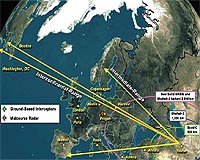 |
Brussels (UPI) May 6, 2010 Building a European-wide missile shield would cost no more than $250 million, NATO Secretary-General Anders Fogh Rasmussen said. At a news conference Wednesday at NATO headquarters in Brussels, Rasmussen said he was in favor to link and expand NATO's missile defense systems to protect the entire continent. "NATO is already building a missile defense system to protect our armed forces when they go out on mission," Rasmussen said. "The cost of expanding that system to cover not only our soldiers but also our populations is less than ($258 million) over 10 years spread among the 28 NATO countries." For that money, Europe will get "full coverage geographically, as well as protection against the threats we can envisage today," he said. Rasmussen said the comprehensive shield was needed to defend a "growing threat" from Iran. "We have a sufficient amount of information and intelligence to know that we are faced with a real threat taking into consideration the Iranian aspirations, as regards to missile technology and nuclear programs," he said. The system would be different from that proposed by Washington but could rely via a command-and-control system on those in place or under construction, he added. Rasmussen said Russia should be involved in the plans from the start. "We would very much like to explore the possibilities, to cooperate, to link the systems," he said. "In the coming months we will have discussions on that within the NATO-Russia Council." He added NATO ministers would decide over such a shield at a summit in Lisbon in November. NATO's push to include Russia in the missile roof follows Washington's pledge to reset relations with Moscow. In an obvious bid to please the Kremlin, Washington last year shelved plans for a missile defense system in Poland and the Czech Republic. U.S. President Barack Obama's predecessor, George W. Bush, pushed for the system to defend against possible Iranian nuclear missiles but the plan caused a major rift with Russia, which took it as a direct threat to its security. Yet the architecture of Obama's new system, which is based on more mobile SM-3 anti-missile units, hasn't entirely convinced Russia, which threatened to deploy the tactical Iskander missile system in the Black Sea region and beef up its naval base across the border in the Baltics. At a summit in Prague, Obama and his Russian counterpart Dmitry Medvedev agreed to jointly assess the ballistic missile threat, and to launch "a serious dialog" about Russian-American cooperation on missile defense.
Share This Article With Planet Earth
Related Links Learn about missile defense at SpaceWar.com Learn about nuclear weapons doctrine and defense at SpaceWar.com All about missiles at SpaceWar.com Learn about the Superpowers of the 21st Century at SpaceWar.com
 NATO chief calls for anti-missile system for Europe
NATO chief calls for anti-missile system for EuropeBrussels (AFP) May 5, 2010 Linking up anti-missile systems to protect NATO's European nations would cost under 200 million euros (250 million dollars) over 10 years, the alliance's secretary general Anders Fogh Rasmussen said on Wednesday. "We have a sufficient intelligence to know that we're faced with a real threat, with Iranian aspirations as regards missile technology and nuclear programmes," Rasmussen told a pres ... read more |
|
| The content herein, unless otherwise known to be public domain, are Copyright 1995-2010 - SpaceDaily. AFP and UPI Wire Stories are copyright Agence France-Presse and United Press International. ESA Portal Reports are copyright European Space Agency. All NASA sourced material is public domain. Additional copyrights may apply in whole or part to other bona fide parties. Advertising does not imply endorsement,agreement or approval of any opinions, statements or information provided by SpaceDaily on any Web page published or hosted by SpaceDaily. Privacy Statement |